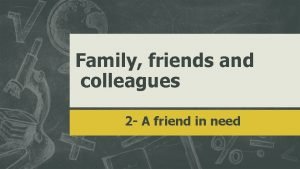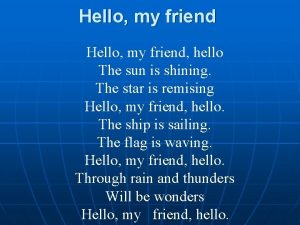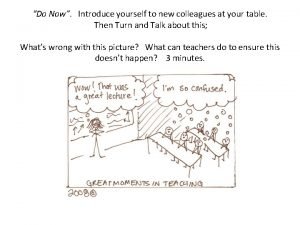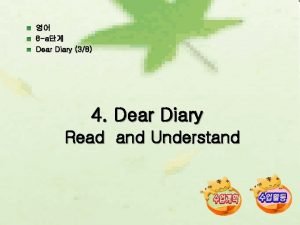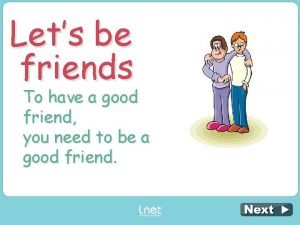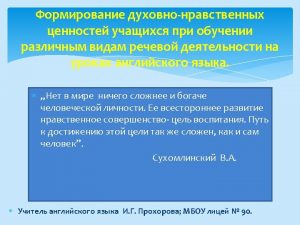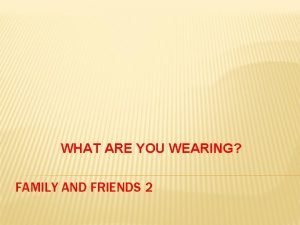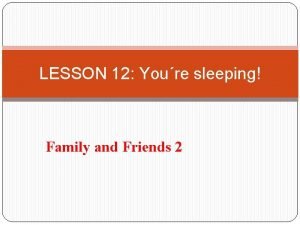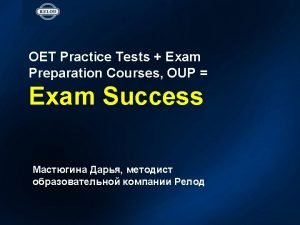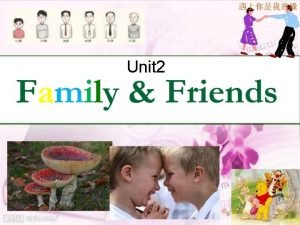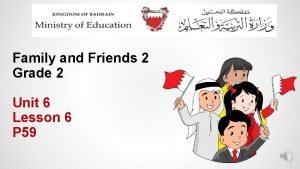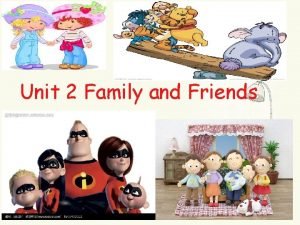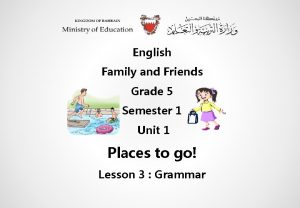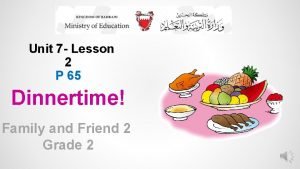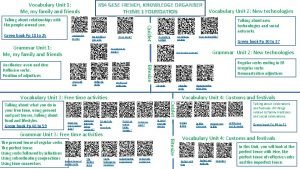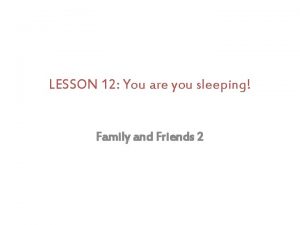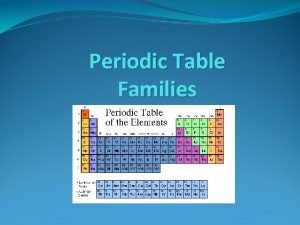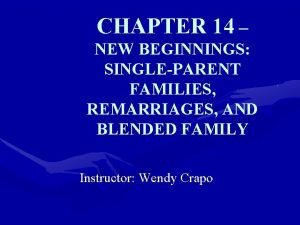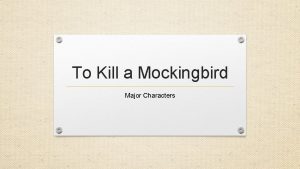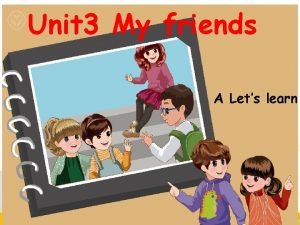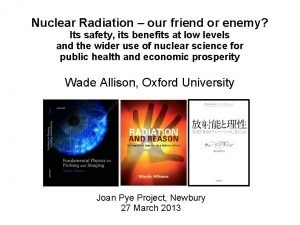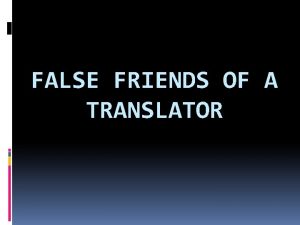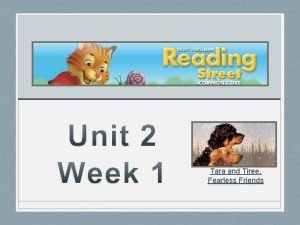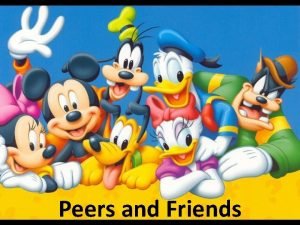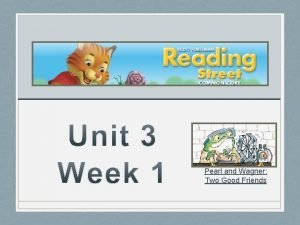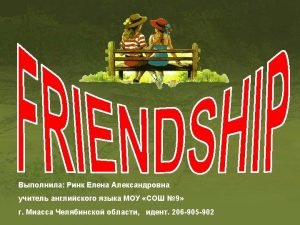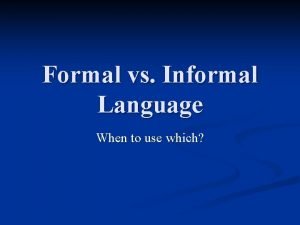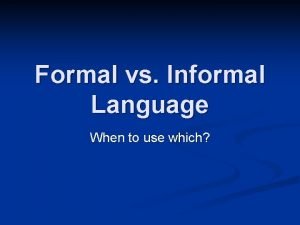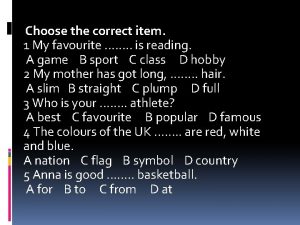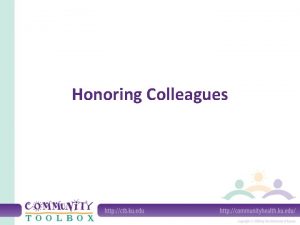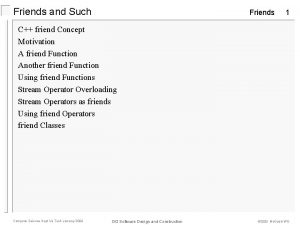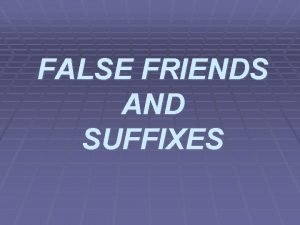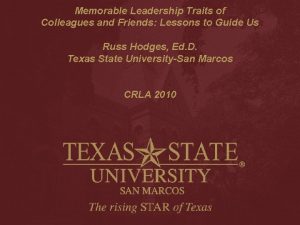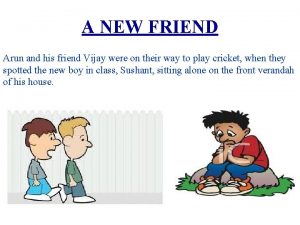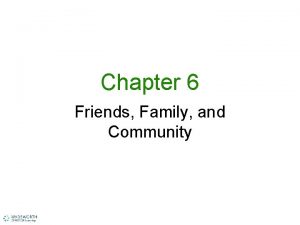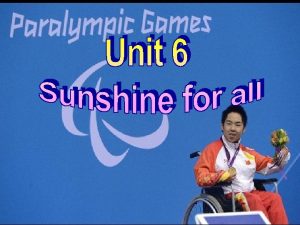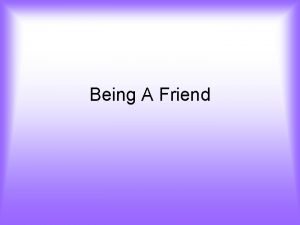Family friends and colleagues 2 A friend in










































- Slides: 42

Family, friends and colleagues 2 - A friend in need

A friend in need is a friend indeed ……………. . Positive adjectives of good friends

1 - speaking “ A friend in need is a friend indeed” In groups discuss the meaning of this saying. Do you agree? !

Listen to the conversation between two brothers, Sami & Jasim, then answer the questions

2 - listening How many people in this conversation? There are two brothers.

2 - listening What is the conversation talking about? It is about friendship.

2 - listening Cynical ……. . ? ? ? If you describe someone as cynical, you mean they believe that people always act selfishly. . If you are cynical about something, you do not believe that it can be successful or that the people involved are honest.

2 - listening Jasim is…. . b) In favor of friendship Sami is…. . a) Cynical about friendship

2 - listening Are you in favor of friendship or are cynical about it?

Listen to the conversation again and note Jasim and Sami’s argument for and against friendship For Against *Friends help you through bad times *Friends sometimes let you down *You can have fun with them *You owe things for friends

2 - listening Think about your friends. In groups discuss the qualities that make them your friends

What does tense do? Tense shows time.

Present simple Present continuous

Present simple

Present continuous

Present simple uses 1 - Habits and routines

Present simple uses 2 - Permanent situations

Present simple uses 3 -The future in regard to schedules

Present simple uses 4 -General scientific truths and facts

Present simple uses 5 -General abilities and talents

Present tenses and time – general uses and special cases. Present Simple 1 - Habits and routines 2 - Permanent situations 3 - The future in regard to schedules 4 - General scientific truths and facts 5 - General abilities and talents Present Continuous 1 - annoying habits ( with always) 2 - Temporary actions or situations 3 - Planned future events 4 - Actions in progress at the time of speaking

Present continuous uses 1 -annoying habits ( with always)

Present continuous uses 2 -Temporary actions or situations

Present continuous uses 3 -Planned future events

Present continuous uses 4 -Actions in progress at the time of speaking

h d i c g a e f

I like this pizza I think you are wrong I don’t understand this lesson. I’m liking this pizza I’m thinking you are wrong I don’t understanding this lesson.

Connected with thinking and opinions Know – agree – understand – guess – think – remember Stative verb like – dislike – love – hate – want - wish Connected with feelings and emotions

What do we call these verbs? And are they always used in present simple or continuous? Stative verb

• These verbs aren’t usually used in continuous forms. They are often used with ‘can’. I think we should go to Croatia for our holiday this year. what did describe you say? things I was thinking my holiday. • Sorry, Stative verbs that areabout not actions. Look carefully at these 2 sentences. Stative verb Thesmells first sentence He of fish. is an opinion but the second sentence is an action. He’s smelling the fish. . The second sentence is an action – not a state. The man wants to know if the fish is OK to eat. .

I can smell something burning ……. I like rally racing ……. I must be seeing things Here see means imagining not see with eyes

That man is look just like …. . the one over there who is looking at his watch. ………? I can’t see.


4 - Exam success You’re going to read an article about the importance factors of friendship. This activity is called as a cloze reading. So what does cloze reading mean?

4 - Exam success You’re going to read an article about the importance factors of friendship. It is an instructional strategy where users are required to fill in the blanks within a passage with correct words.

4 - Exam success very that most these their 8 5 2 10 3 7 4 9 1 6 than which more and some

5 - reading and speaking Read the article again and answer the question

5 - reading and speaking What do you think “win-win outcomes” means? advantageous or satisfactory to all parties involved (a win-win situation/ a win-win deal). Ex / when you like the chips and your friend likes the pickle so she trades you her chips for your pickle.

5 - reading and speaking How might a friend feel if he/she always loses arguments? They feel unhappy because the friendship isn’t equal or balanced.

5 - reading and speaking What types of shared interests strengthen friendships? Those which directly relate to the friendship such as recreational interests or career interests.

5 - reading and speaking What is the main point of the article? The main point of the article is to show that similarity between two people increases happiness in all the important areas of a friendship.

Workbook p 6 Homework p 6 – 7 (a – b - c) Thank You
 Family friends and colleagues
Family friends and colleagues Dear friends and colleagues
Dear friends and colleagues Hello my friend hello song
Hello my friend hello song Hello my friend
Hello my friend Little friends may prove great friends meaning
Little friends may prove great friends meaning Revalidation feedback examples for nursing colleagues
Revalidation feedback examples for nursing colleagues Introduce yourself to new colleagues
Introduce yourself to new colleagues Dear diary 뜻
Dear diary 뜻 Good afternoon students
Good afternoon students Let's be good friends
Let's be good friends Foaf a matic
Foaf a matic A friend in needs a friend indeed
A friend in needs a friend indeed I've found a friend oh such a friend
I've found a friend oh such a friend Family and friends 2 unit 11
Family and friends 2 unit 11 Family and friends 2 you are sleeping
Family and friends 2 you are sleeping Family and friends 2 what are you wearing
Family and friends 2 what are you wearing English
English Family and friends unit 2
Family and friends unit 2 Tuesday morning prayer for family and friends
Tuesday morning prayer for family and friends Family and friends 2 unit 6
Family and friends 2 unit 6 Family and friends 1 unit 2 video
Family and friends 1 unit 2 video 5 words english
5 words english Unit 7 lesson 2
Unit 7 lesson 2 Friends and family vocabulary
Friends and family vocabulary Family and friends 2 lesson 7
Family and friends 2 lesson 7 Difference between nuclear family and joint family
Difference between nuclear family and joint family Varies from family to family on the periodic table
Varies from family to family on the periodic table Blended family vs binuclear
Blended family vs binuclear Jean louise
Jean louise My friend and i am tall and thin
My friend and i am tall and thin Unit 3 my friends
Unit 3 my friends What makes good friends
What makes good friends For parents and friends radiation threat
For parents and friends radiation threat False friends of translator
False friends of translator Tara and tiree, fearless friends
Tara and tiree, fearless friends Friends and peers
Friends and peers Pearl and wagner reading street
Pearl and wagner reading street Romeo and his friends
Romeo and his friends There are many proverbs about friends and friendship
There are many proverbs about friends and friendship This is an informal language used by peers and friends
This is an informal language used by peers and friends This is informal language used by peers and friends
This is informal language used by peers and friends 1.choose the correct item
1.choose the correct item Good morning dear students poem
Good morning dear students poem
